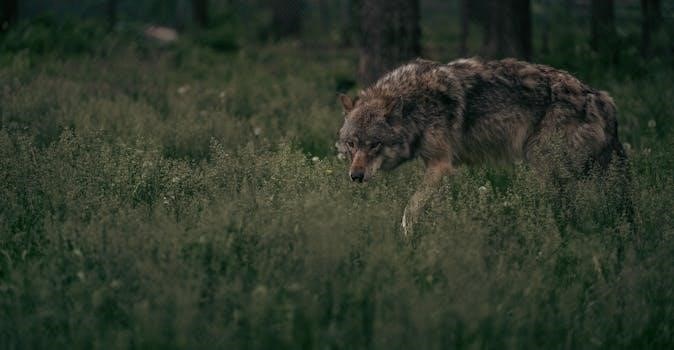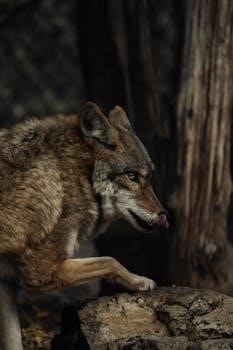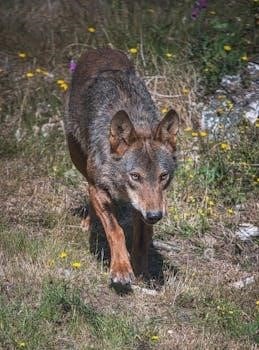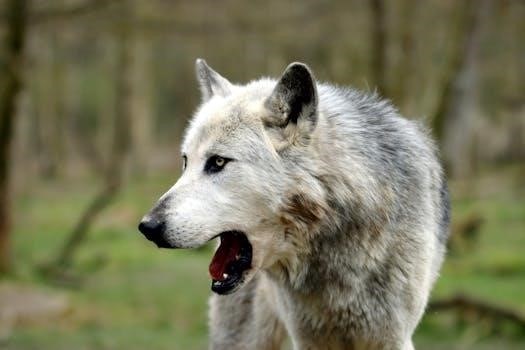guided wolf hunts
Category : Guide
Guided Wolf Hunts⁚ A Comprehensive Overview
Guided wolf hunts offer hunters the chance to pursue wolves in various locations. Outfitters provide expertise, equipment, and access to prime hunting areas. These hunts often focus on ethical practices and conservation efforts.
Guided wolf hunts present an immersive experience for both seasoned hunters and newcomers to predator hunting. These hunts, facilitated by experienced outfitters, offer access to remote wilderness areas where wolves thrive. Outfitters often utilize proven methods such as calling and tracking by snowmobile, increasing the chances of a successful hunt. Furthermore, guided hunts provide valuable insights into wolf behavior, habitat, and conservation, ensuring a rewarding and educational adventure. These hunts often take place during winter months for the best opportunities.

Locations for Guided Wolf Hunts
Guided wolf hunts are available across diverse regions. North America, particularly Idaho, Montana, Wyoming, and Canada, provides prime wolf hunting destinations. Opportunities also exist in Europe and Asia, including Russia.
North America⁚ Prime Wolf Hunting Destinations
North America offers several prime locations for guided wolf hunts. States like Idaho, Montana, and Wyoming boast significant wolf populations and experienced outfitters. Canada, including British Columbia, Alberta, and Manitoba, also presents excellent opportunities for wolf hunting. These regions provide vast wilderness areas and diverse hunting methods. Hunters can find guided hunts on both public and private lands. Outfitters utilize various techniques, including calling, tracking with snowmobiles, and hunting with hounds, to enhance the chances of a successful wolf hunt.
International Wolf Hunting Opportunities
Beyond North America, international wolf hunting opportunities exist in several countries. Europe offers guided wolf hunts in regions like Spain, Bulgaria, Macedonia, Belarus and the Baltic states. Russia also presents possibilities for wolf hunting expeditions. These international hunts often take place in vast, remote areas. Hunters should research specific regulations and licensing requirements for each country. Outfitters specializing in international wolf hunts can provide valuable assistance. They will ensure compliance with local laws and ethical hunting practices. Consider consulting experienced guides for a safe and successful international wolf hunt.
Timing and Seasonality of Wolf Hunts
Wolf hunts are typically scheduled during winter. The winter months are when wolf fur is in prime condition. Late winter can also be a strategic time due to food scarcity.
Winter Hunts⁚ Optimal Fur Condition
Guided wolf hunts during the winter months capitalize on the prime condition of wolf fur. This season, often spanning from December to February, aligns with when the pelts are thickest and most valuable. Outfitters like Linehan Outfitting schedule wolf-specific hunts within this timeframe, as well as CCHA whose season runs December 15 to February 28. Hunting during this period ensures hunters have the best chance of harvesting wolves with exceptional fur quality.
Late Winter⁚ Vulnerability Due to Food Scarcity
In late winter, guided wolf hunts can be particularly effective due to the scarcity of food. As winter progresses, wolves may become more vulnerable, increasing their activity in search of sustenance. This period, often from mid-February onward, presents opportunities for hunters. Outfitters may adjust their strategies to capitalize on this vulnerability, increasing the chances of a successful hunt, as wolves are more desperate to find food sources during this time.

Hunting Methods and Techniques
Wolf hunts involve various methods, including calling, tracking, and hunting with hounds. Some guides employ trapping techniques with necessary licenses. Snowmobiles aid in wilderness access for tracking wolves in expansive terrains.
Calling and Tracking
Calling and tracking are vital techniques in guided wolf hunts. Guides utilize wolf vocalizations to attract wolves, mimicking distress calls or pack communication. Tracking involves identifying and following wolf tracks in snow, often using snowmobiles to cover vast areas. This method requires keen observation skills to determine the direction of travel, age of the tracks, and potential ambush locations. Hunters also rely on the guide’s expertise to interpret wolf behavior and movements, increasing the chances of a successful hunt within ethical and regulatory guidelines.
Hunting with Hounds
Hunting with hounds is a technique used in certain regions for guided wolf hunts. Trained hounds are released to track and pursue wolves, allowing hunters to follow their progress. This method is particularly effective in areas with dense cover. The hounds’ ability to locate and bay up wolves can provide hunters with an opportunity to harvest the animal. Responsible outfitters prioritize the well-being of the hounds and adhere to local regulations regarding their use. Hunting with hounds requires careful management and coordination between the guides, hunters, and dogs.
Trapping with Licensed Guides
Trapping with licensed guides offers another approach to guided wolf hunts. Guides certified in trapping set and manage trap lines in areas with wolf activity. This method requires expertise in trap placement, lure selection, and animal handling. Hunters can accompany guides on the trapline, learning about trapping techniques and participating in the process. Trapping is often regulated, with specific requirements for trap types and locations. Licensed guides ensure compliance with these regulations and prioritize humane trapping practices. This method can be effective in areas where other hunting techniques are less successful.
Essential Gear and Equipment
Essential gear for guided wolf hunts includes appropriate clothing for cold weather, reliable firearms, and specialized equipment for tracking and calling. Snowmobiles are often used for accessing remote hunting locations.
Hunting Clothes for Varied Weather Conditions
Hunting clothes for guided wolf hunts must accommodate unpredictable and rapidly changing weather. Temperatures can range dramatically, from mild to severely cold, often within a single day. Layering is crucial to adapt to these shifts effectively. Hunters need waterproof and windproof outer layers to combat snow, rain, and blustery conditions. Insulated boots and gloves are vital for maintaining warmth and dexterity. Consider clothing suitable for temperatures as low as -10°F to ensure comfort and safety during extended periods in the wilderness. Choosing appropriate apparel significantly enhances the hunting experience.
Snowmobiles for Wilderness Access
Snowmobiles are essential for accessing remote areas during guided wolf hunts, especially in regions with significant snowfall. These vehicles enable hunters and guides to navigate deep snow and traverse rugged terrain efficiently. The use of snowmobiles allows for covering vast distances in search of wolf tracks and optimal hunting locations. They are particularly valuable in areas where traditional vehicles cannot operate due to snow accumulation or challenging topography. Utilizing snowmobiles increases the hunter’s range and opportunities for locating wolves. Some outfitters even utilize snowmobiles for calling and tracking.
Accommodations and Amenities
Guided wolf hunts often include lodging and amenities. Options range from comfortable lodges with home-cooked meals to rustic cabins in wilderness areas. These accommodations provide hunters with essential comforts during their expedition.
Lodge-Based Hunts with Home-Cooked Meals
For those seeking comfort alongside their wolf hunting adventure, lodge-based hunts offer a welcoming retreat. These hunts provide accommodations in cozy lodges, often featuring home-cooked meals. After a day of tracking and calling wolves, hunters can relax and enjoy the comforts of home; Shared stories around the dinner table and a warm, comfortable bed provide a perfect end to each day, enhancing the overall hunting experience. This option allows hunters to focus on the hunt while enjoying quality relaxation.
Cabins in Wilderness Areas
For a more immersive and rugged experience, wolf hunts often provide accommodations in remote cabins within wilderness areas. These cabins offer a rustic and secluded environment, far from the distractions of modern life. Hunters can fully embrace the wilderness setting, surrounded by the natural habitat of wolves. While the amenities may be basic, the experience of staying in a wilderness cabin allows hunters to connect with the land on a deeper level, providing a unique and memorable hunting adventure, perfectly suited for those seeking solitude and raw nature.

Licensing and Tag Requirements
Wolf hunts necessitate compliance with specific regulations. Hunters must obtain the proper licenses and wolf tags before participating. Availability and requirements vary by region, so research is essential.
Wolf Tag Availability
The availability of wolf tags is a crucial factor for hunters planning a guided wolf hunt. Certain regions offer guaranteed wolf hunt tags, whereas others have quotas or lottery systems. Contacting outfitters or wildlife agencies directly provides the most accurate information. For instance, in some areas, hunters may be allowed multiple tags, increasing their chances of a successful hunt. However, these tags are often limited, so securing them well in advance is highly recommended.
Regulations in Different Regions
Wolf hunting regulations vary significantly across regions. Hunters must familiarize themselves with specific rules in their chosen hunting location. These regulations encompass hunting seasons, permissible hunting methods, and reporting requirements. For example, some regions might allow hunting with hounds, while others restrict it. Additionally, regulations often specify the legal equipment, such as firearms or traps. Outfitters are knowledgeable about local regulations and ensure compliance. Ignoring these regulations can lead to severe penalties, including fines and hunting license revocation.

Typical Duration and Packages
Guided wolf hunts typically last for several days, often around five. Packages include lodging, meals, and transportation to hunting sites. Some outfitters offer combination hunts, such as wolf and mountain lion.
5-Day Guided Wolf Hunt Packages
Many outfitters offer 5-day guided wolf hunt packages, providing a comprehensive experience. These packages generally include comfortable lodging, often in a lodge setting with home-cooked meals. Transportation to and from hunting locations, such as bait sites, is also typically covered. Hunters can expect expert guidance on calling and tracking techniques. These hunts often utilize 4-wheel drive trucks and snowmobiles for access to remote areas. Be ready for temperatures ranging from 50 to -10 F. The goal is an unforgettable wilderness adventure.
Combination Hunts (Wolf and Mountain Lion)
For those seeking a diverse hunting experience, combination hunts targeting both wolves and mountain lions are available. These hunts often take place during the winter months, capitalizing on optimal fur conditions and snowy tracking environments. Outfitters may use hounds to pursue mountain lions, while calling and tracking are common methods for wolves. Hunters can explore vast terrains, potentially covering millions of acres, including national forest and wilderness areas. Such hunts provide opportunities to observe other wildlife, such as bighorn sheep, elk, and deer, in a pristine wilderness setting.
Ethical Considerations and Conservation
Ethical wolf hunting practices are essential for maintaining healthy wolf populations and ensuring the sustainability of guided hunts. Responsible outfitters adhere to regulations and promote fair chase principles. Conservation efforts, such as proper tag management and regulated hunting seasons, play a crucial role in managing wolf populations. Hunters should prioritize respect for the animals and their habitat, aiming for clean and humane harvests. Supporting outfitters committed to conservation helps ensure the long-term viability of wolf populations and the continuation of hunting opportunities. Education and awareness are also vital components of ethical hunting.
Outfitter Selection and Booking
Selecting the right outfitter is crucial for a successful wolf hunt. Research potential outfitters, checking their experience, reputation, and commitment to ethical hunting. Look for outfitters with experienced guides and knowledge of the hunting area. Verify their licenses and permits. Consider their hunting methods, accommodations, and equipment provided. Read reviews and testimonials from previous clients. Contact the outfitter to discuss your expectations and ask questions about the hunt. Book your hunt well in advance, especially for popular destinations and seasons. Ensure that the outfitter has proper insurance and adheres to all regulations.
